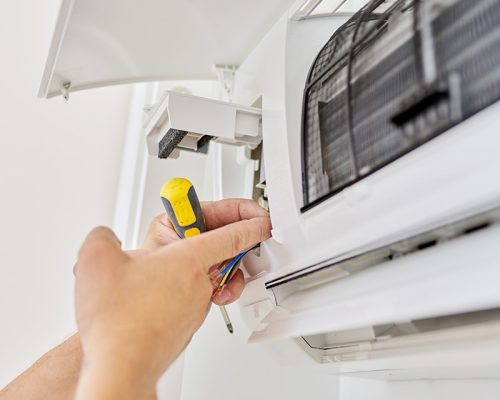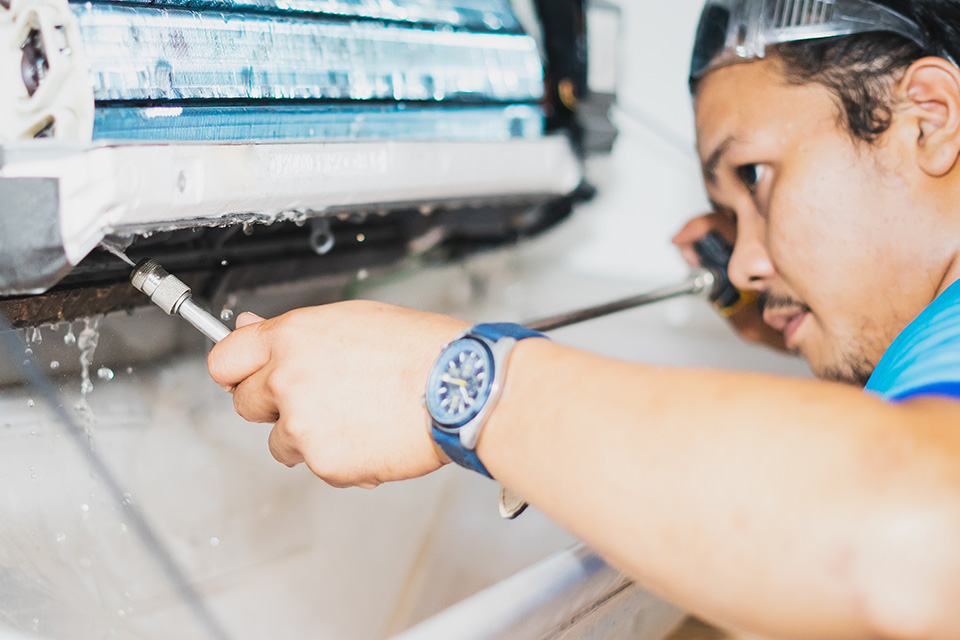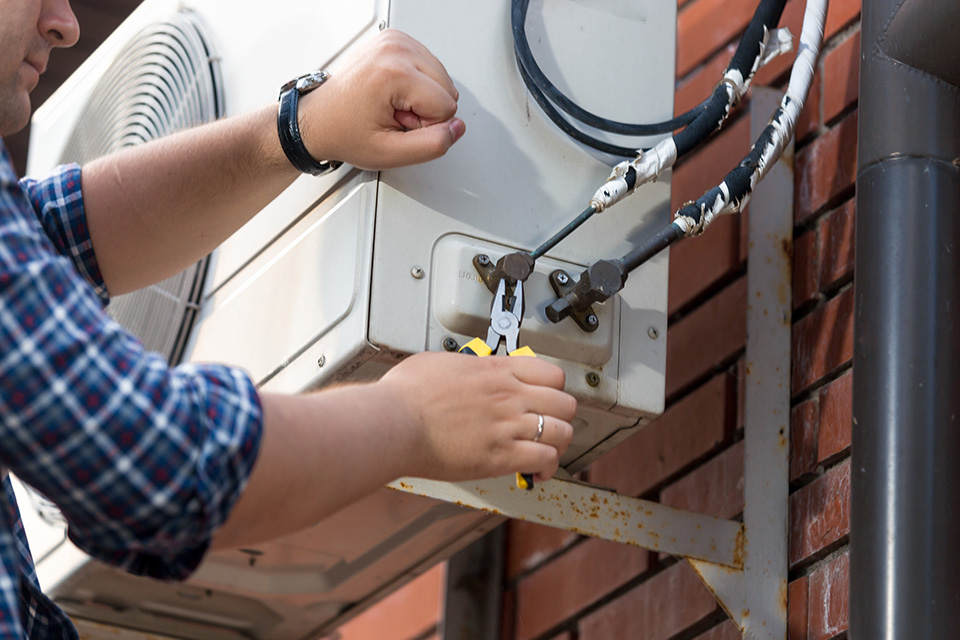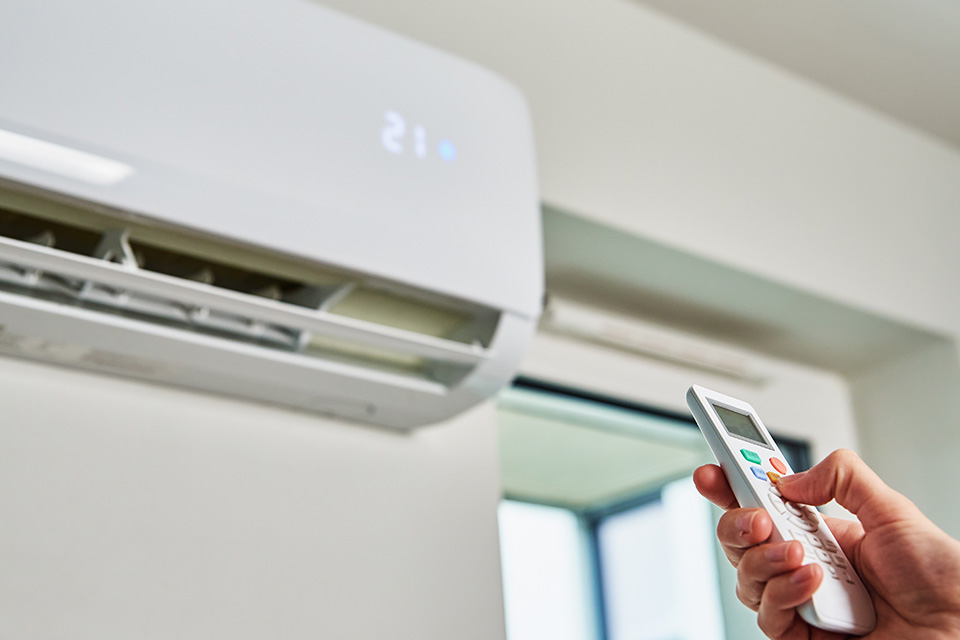
How Much Electricity Does a Heater Use?
June 4, 2024
A Guide to The Air Conditioner Rebate in Victoria
December 16, 2024How Often To Service An Air Conditioner

Air conditioners require regular servicing and maintenance to function at their best. Most manufacturers recommend scheduling a service about every 12 to 24 months for preventive measures. During a routine service, a technician conducts a thorough cleaning and checks the air conditioner’s gas levels or electronics, ensuring optimal operation throughout the year. Without proper servicing and maintenance, an air conditioner may struggle to perform efficiently, leading to increased energy bills. Keep reading to learn about the frequency of air conditioner servicing, its essential components, and signs indicating the need for servicing.
Why Air Conditioning Servicing is Important
Air conditioning servicing and maintenance is vital for the efficiency and longevity of the unit. Like any mechanical appliance, regular servicing ensures the air conditioner continues to function at optimum efficiency. Regular air conditioner servicing has a number of benefits. These include:
- Optimum performance. Servicing and maintenance will improve the cooling or heating capability of your air conditioner and assure it is working at maximum capacity. An air conditioner’s coils, filters and fins require maintenance and cleaning for the unit to function effectively. When the air conditioner and its parts are dirty, they tend to get clogged and stop working properly, reducing the cooling capabilities. Having them cleaned and serviced helps the air conditioner to work like new.
- Improve air quality and reduce bacteria. Regular servicing and cleaning removes the dust, mould and pollen buildup inside the air conditioning unit. The service technician will clean the filters so that less dust and allergens can enter the room when the air conditioner is operating. This is significant for everyone but particularly those that suffer from allergies or respiratory issues.
- Increase energy efficiency. An air conditioner can lose up to 5% of its efficiency each year if not serviced properly. Regular servicing and maintenance will help increase energy efficiency as your air conditioner will be performing better and thus using less energy. Without servicing, coils and filters become blocked with dust and dirt, causing the air conditioner to work harder to maintain a comfortable room temperature.
- Saving money: Regular air conditioning services help identify any issues before they become costly problems. By paying a service fee or for necessary parts, you can prevent the need for a complete air conditioner replacement through consistent maintenance. Additionally, routine servicing promotes a more efficient cooling system, reducing energy consumption and keeping utility bills lower.
- Extend life of the air conditioner. The average lifespan of an air conditioner is around 10 to 15 years but, without preventative maintenance and servicing, that figure could be halved. Air conditioners need to be looked after to keep them healthy. Replacing damaged parts and keeping the air conditioner can help extend the life of the air conditioner.
- To ensure small issues are detected early. Regular servicing and maintenance can detect small repairs before they turn into big, more expensive problems.
- Uphold warranty. One of the criteria for a warranty is regular servicing from the date of installation. To uphold the warranty, the air conditioner must be serviced according to the warranty instructions.

How Often Should An Air Conditioner Be Serviced?
Most experts agree that air conditioners should be serviced every 12 – 24 months. Leading into summer it is important to check the air conditioner’s filters to ensure optimum performance. Here are some factors that may influence how often an air conditioner should be serviced, including the type of unit, environment, season and usage frequency.
- Frequency. How often you use your air conditioner can significantly impact the frequency of servicing. If it is used throughout the year, it may need a service a couple of times a year as wear and tear will be more significant.
- Environment. If you have pets around or plants there can be increased allergen levels in the environment. This will increase the need for regular use to remove the dust and particles from the air. Increased usage will require increased servicing and maintenance.
- Season. When the weather is extremely hot in the summer or cold in the winter, reverse cycle or split system air conditioners tend to be used more often and require more cleaning.
- Climate. The climate you live in will impact how often the unit is used. If you live in an extremely hot and humid climate like Darwin, the air conditioner may be running most of the time. It will then need more regular servicing.
Types of Air Conditioners and Service Frequency
The type of air conditioner can also impact the frequency of servicing required.
- Split system/ Reverse cycle. If you have a split system or reverse cycle, servicing twice a year before summer and winter is recommended. Working to both heat and cool, split systems and reverse cycle units work all year round. Servicing in autumn and spring is ideal as the units will be in minimal use.
- Wall air conditioner. It is important to service a wall air conditioner at least once a year to make sure it is running smoothly and detect any potential issues before they cause damage. An air conditioner technician will look for any subtle damage or problems that could cause a system breakdown if left unattended. Fixing small problems will increase the lifespan of the unit and improve energy efficiency. If the wall mounted air conditioner is a split system, have it cleaned and serviced twice a year prior to summer and winter.
- Evaporative cooling. Evaporative cooling should be serviced once a year to avoid malfunction throughout the hot summer months. During the year, dust and debris can clog up the unit and cause pump problems which impede the airflow. A regular service can help prevent these issues, save you money and improve energy efficiency.
- Ducted air conditioner. Ducted air conditioning is continually circulating air which can lead to dust building up in the fan. A regular yearly service is recommended if the unit is used purely for air conditioning. However, as most ducted air conditioners tend to be reverse cycle these days, specialists suggest twice yearly maintenance for optimum performance in the heat of summer and cold winter months.
How Are Air Conditioners Serviced?
To service an air conditioner, a skilled technician will perform a thorough maintenance check to ensure the system continues to reliably function for a prolonged period. This is what the technician will do when servicing an air conditioner.
- Clean the indoor and outdoor unit
- Clean the condenser coils and evaporator
- Inspect the refrigerant levels. Top up or replace fluid if needed
- Check the drain pan and condensate drains. Clean if needed
- Check the fans, motors, blades and blower are in good working order
- Check the refrigerant tubing and compressor
- Lubricate the moving parts in the system
- Clean or replace the air filters
- Check for any leaks
- A general test of the entire system to make sure it is working properly.

Signs An Air Conditioner Needs Servicing
While an air conditioner needs to be serviced annually, sometimes there will be signs the unit needs extra attention. If your air conditioner has any of these signs, it might be time to book a service.
- Reduced airflow. A reduction in the amount of cold air coming out of the air conditioner is a sign that something may need to be fixed. A well functioning air conditioner is capable of blowing out strong, cold air into the room. The most common reasons for reduced airflow include a clogged air filter, frozen evaporator coils, leaky or blocked air ducts, or problems with the air conditioner blower.
- Blowing hot air instead of cold. If your air conditioner is blowing hot air regardless of the settings you choose, there could be a number of causes. One of the most common reasons is that the filters need replacing or cleaning, or the condenser coils are dirty or blocked. Alternatively, it could be a bigger issue like a damaged compressor which will need immediate attention from a professional air conditioner technician. Whatever the cause, it is essential to have the unit serviced as soon as possible to define the problem before it becomes irreparable.
- Odours. Strange odours may be a sign that the air conditioner filter needs to be replaced, or that the unit needs cleaning. If the smell is musty, it is potentially due to mould or mildew building up in the air conditioner. Mould builds up in moisture prone areas and can lead to respiratory issues. If the odour smells like burning, it could be burnt out wires which could be a fire hazard.
- Noises. If the air conditioner begins making noises, other than the usual sound, it is a sign there may be a mechanical problem. A service will identify the source and repair it before it gets worse.
- Leaks. Sometimes air conditioners will develop condensation and small amounts of water will be visible. However, if there is a significant amount of leaking water, it could be a sign of a cracked unit or blocked pipes. Alternatively, dirty evaporator coils or low refrigerant can cause the condensate to freeze on the coils which will cause water leakage.
- Won’t turn on/off. An air conditioner that won’t turn on or off could be the sign of a faulty thermostat, frozen evaporator coils or electrical issue. An air conditioner that will not turn on or off needs to be serviced by a professional to diagnose the root cause and solution.
- Higher energy bills. If you have noticed a sudden increase in energy bills, it could be a sign that the air conditioner is not operating properly. Even if the air conditioner is still cooling the rooms efficiently, it may be working harder to do that, using more electricity, and increasing bills.
Should You Replace Your Air Conditioner?
Most air conditioners have a lifespan of 10 to 15 years if serviced and maintained well. Eventually a unit will need to be replaced. These are the signs that indicate it may be time to replace your air conditioner.
- More than 15 years old
- Out of warranty
- Services are no longer fixing the problem
- Leaking, noises or mechanical issues that cannot be fixed
- Frequent repairs
- Acid forming or corrosion on the outside unit

All air conditioners need to be serviced every 12 to 24 months. Insufficient servicing leads to poor performance, potential damage, increased energy consumption, and higher bills. Our thorough guide to air conditioning servicing explains why servicing is important, how frequently they should be serviced, and potential signs your air conditioner needs replacing. For further information on air conditioner servicing, contact the experts at Simply Air.
 Schedule a quote
Request a callback
Schedule a quote
Request a callback

Call us Mon-Fri: 8:30am-5pm or leave us a message for a callback.
